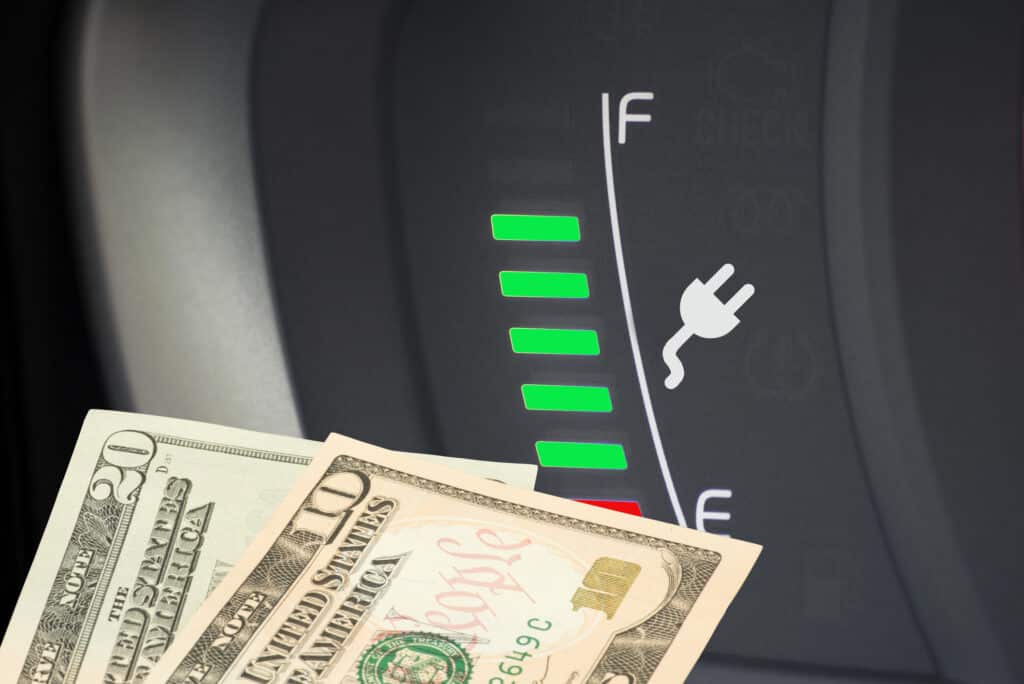Costs of EV Ownership
September 25, 2023
Calculating 5 Years of Owning an Electric Vehicle in the Pacific Northwest
In Washington and Oregon, seeing electric vehicles (EVs) on the road is becoming more common by the day. How much does cost to own over five years?
Five years serves as a practical yardstick when assessing the true cost of a car – long enough to feel the rhythm of ownership but not too extended to wander into unpredictable territories.
In the Pacific Northwest, where sustainability isn’t just a buzzword but a lifestyle, EVs resonate on a different frequency. Over a five-year span, these vehicles might surprise you. The initial price tag might seem steep, but factor in the diminished fuel expenses, potential tax incentives, and the notably reduced maintenance costs, and you’ll likely view the total cost in a different light. By embracing the “5-Year Cost to Own” framework, you’ll gain insights into the tangible (charging costs, insurance) and the not-so-obvious (battery health, potential increase in resale value).
Whether you’re cruising along the Columbia River or navigating the bustling streets of Seattle, understanding the financial roadmap of EV ownership in this region will empower you to drive forward with confidence.
Investing in an Electric Car: Pacific Northwest Edition
When considering the prospect of EV ownership, you need to think beyond the upfront cost of the vehicle. Electric vehicles typically have a higher upfront cost compared to traditional gas-powered vehicles. However, the cost of ownership over the long term is lower due to lower maintenance and fuel costs.
For our eco-conscious residents in the Pacific Northwest, let’s dissect the financial layers of EV ownership.

Initial Purchase Price
Embarking on the EV journey begins with understanding the initial purchase price. As you traverse the market, remember that the upfront cost of electric vehicles is higher than traditional gas-powered cars. This is because of the battery: Batteries are the most important component of an EV and are made from minerals like lithium, cobalt, and nickel. These minerals are in high demand, and the expensive processes involved in battery production also contribute to the cost.
Financial support for EV buyers isn’t sparse, especially in our region. Take a moment to explore some of the latest incentives:
Depreciation
Much like that shiny new smartphone, cars don’t retain their brand-new value forever. In fact, traditional vehicles often face a steep drop in worth within the first year itself. However, the narrative is starting to change with the rise of electric vehicles. As electric technology continues to evolve and gain a firmer footing in the mainstream market, the residual value of these vehicles is expected to follow a more gentle depreciation gradient. This means that investing in an EV is like investing in a timeless piece of fashion that doesn’t quickly go out of style. With the increasing popularity and advancements in EV technology, the value of these vehicles is likely to hold up better over time compared to their traditional counterparts.
Battery Replacement
The battery of an EV is analogous to the engine in a gasoline car—it’s pivotal. And, like all things pivotal, it demands attention over time. Manufacturers often roll out with long-term warranties, some stretching beyond eight years. Yet, post-warranty, a battery replacement might eventually be needed. It’s an element to keep in the cost-analysis loop, much like setting aside funds for a rainy day.
Miles Driven
Your vehicle’s odometer readings aren’t just numbers; they’re a chronicle of your journey. For an EV, more miles might mean quicker battery wear, while in gasoline cars, it may translate to frequent service intervals. It’s about knowing your travel narrative. Much like a runner who calculates their miles, knowing your driving pattern helps forecast potential costs.
Maintenance Costs
Sure, EVs have fewer moving parts, but they aren’t entirely maintenance-free. They still need their tires rotated, brakes checked, and the occasional repair. It’s much like owning a low-maintenance plant: while it might not need daily watering, it still needs some love and care.
An EV maintenance schedule is crucial for ensuring optimal performance and longevity of electric vehicles. Regular maintenance helps identify and address potential issues early on, ensuring the safety, efficiency, and reliability of the vehicle over its lifespan.
Energy Usage
While EV charging isn’t exactly a gift from the heavens, it’s often lighter on the wallet than frequent gas station visits. By studying your EV model’s energy appetite and juxtaposing it with local electricity rates, you can forecast your energy expenditure. Consider it akin to planning a monthly grocery budget.
Gasoline Costs
For those still leaning towards gasoline vehicles, fuel prices remain a pivotal determinant. They’re like the stock market, ever-changing and unpredictable. By evaluating your driving forecast and your car’s mileage, you can earmark a tentative fuel budget for the coming years.
Charging Costs
Charging isn’t a one-size-fits-all game. Home charging stations might be a snug fit for nightly top-ups, but on-the-go, public charging spots, especially the speedy ones, might have a different rate card.
It’s all about strategizing your charging habits, much like you’d pick your preferred coffee shop based on quality, convenience, and cost.
Buying a New Electric Car
Driving off the lot with a brand-new EV is akin to stepping into the future. With the newest EV cars you get the latest tech integrations and battery efficiency. You also get comprehensive manufacturer warranties, especially on crucial components like the battery that offer peace of mind as a new EV owner.
We recommend this route because it’s usually the best one. Purchasing a new EV ensures that you are the first owner, which means you have complete knowledge of the vehicle’s history and maintenance. Some tax rebates or credits are applicable only to the first owner of an EV, meaning buying new can provide financial benefits. When buying new, you also have the option to customize features, colors, and add-ons to your liking. Lastly, starting with a new vehicle typically means a higher resale value when it comes time to trade in or sell.
Want to purchase a new electric vehicle? Dick Hannah Dealerships is ready to turbocharge your journey. We offer the latest EVs from trusted brands like Ford, Chevy, Toyota, Honda, and Kia. Every drive becomes a statement of sustainability and forward-thinking when you choose electric. Navigate our premium selection at our website and find the EV that resonates with your vision. With us, you’re not just buying a car; you’re investing in a greener future. Come on over and experience why we always ‘Believe in Nice’.
Venturing into the Used Electric Car Market
With the green movement gaining momentum in our region, the pre-owned EV space is expanding. As with any vehicle purchase, aspects like the car’s age, mileage, and upkeep dictate its price. Yet, with EVs, the battery’s health is critical to pay attention to. It’s a testament to the car’s life and performance. Lucky for second-hand buyers, many manufacturers extend their warranties, alleviating concerns about unforeseen expenses. Armed with diligent research, opting for a used EV can be both an economical and environmentally sound choice.
Thinking about diving into the electric vehicle revolution, but seeking more budget-friendly options? Look no further! At Dick Hannah Dealerships, our carefully curated inventory of used EVs ensures that you get nothing but the best. Every vehicle in our lineup has passed rigorous checks to earn our trust, and with our renowned “Peace of Mind Pre-Owned Promise,” you can drive away confident in your choice. Experience the future of driving and enjoy significant savings. Check out our latest electric vehicles on offer here.
EV vs. Gas: The Long-Term Cost Showdown
At first glance, the initial purchase price of an electric vehicle might seem a tad high compared to their gasoline counterparts. However, if one considers the expansive financial canvas of long-term ownership, EVs frequently emerge as the more economical choice.
- Fueling Economics: Electricity in the Pacific Northwest averages below the national rate. This, combined with the region’s wealth of charging stations—many of which offer free or heavily discounted charging—paints a financially appealing picture for prospective EV owners. In simple terms, think of it as opting for a reusable water bottle over constantly buying pricey bottled water.
- Maintenance Dynamics: The beauty of an EV lies not just in its silence but also its simplicity. With fewer moving components, EVs elegantly sidestep several maintenance procedures intrinsic to gasoline vehicles. Over years of ownership, it’s akin to skipping your daily coffee shop run and making your coffee at home; the savings certainly add up.
- Resale Prospects: The Pacific Northwest is riding the green wave, and its appetite for sustainable transport options is voracious. This growing demand means that EVs aren’t just a trending choice; they might also promise enticing resale values, often giving their gasoline peers a run for their money.
The Takeaway
In the Pacific Northwest, the allure of electric vehicles (EVs) extends beyond environmental consciousness. We have affordable electricity rates in our area, and we are also developing more electric vehicle infrastructure. This means we can save money on electricity costs and enjoy the benefits of electric vehicles.
When you factor in tax incentives and the minimal maintenance EVs require, the financial appeal becomes evident. As the Pacific Northwest champions a sustainable future, driving an EV becomes more than just an eco-friendly choice—it’s a wise investment and a reflection of the region’s forward-thinking spirit.
Contact Us
